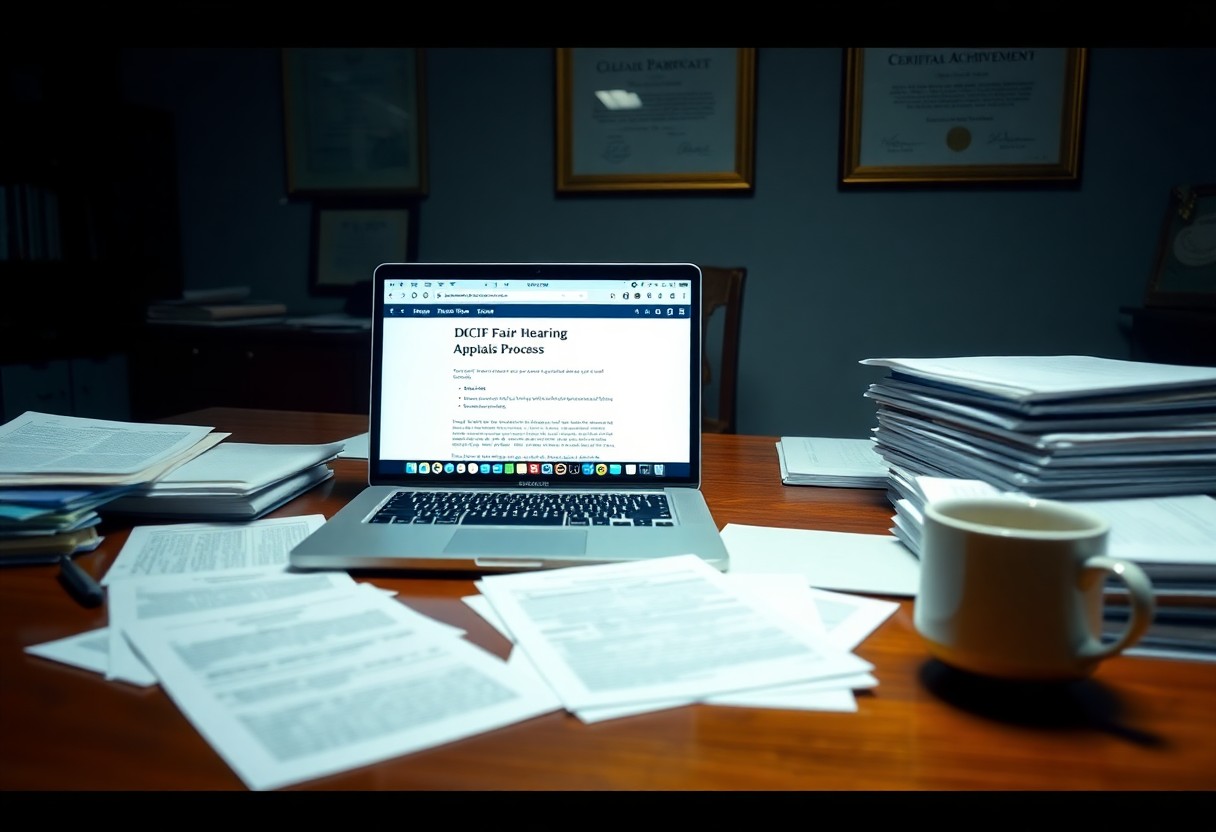You may find yourself feeling overwhelmed if you lose a DCF fair hearing. Understanding the implications of this outcome is crucial for navigating your options moving forward. This blog post will explore the potential consequences you face, including your right to appeal and any necessary steps to take in order to protect your interests. By familiarising yourself with the process, you can better prepare for the next steps in addressing the situation at hand.

Key Takeaways:
- Loss of a DCF fair hearing means the initial decision regarding your case stands, and you may be required to comply with any actions or requirements imposed by the department.
- You may have the option to appeal the decision to a higher authority or court, depending on the specific regulations governing your situation.
- It is advisable to seek legal counsel or assistance to explore your options for appealing or to understand the ramifications of the hearing outcome.
- Failure to win the fair hearing might affect your eligibility for benefits, services, or any ongoing support from the Department for Children and Families (DCF).
- It is important to remain informed about any deadlines associated with appeals to ensure your rights are protected in subsequent legal processes.
The Immediate Consequences of a Lost DCF Fair Hearing
A denial following a DCF fair hearing represents a significant hurdle in your pursuit of assistance or services. The initial impact of this decision is not merely about losing the appeal; it encompasses a range of implications that can affect your immediate circumstances and future options. Having your hearing outcome unfavourably resolved means the prior determinations about your case remain in effect, which can lead to an ongoing state of uncertainty. You may find yourself grappling with the same challenges or obstacles that you sought to rectify through the fair hearing process.
Further complications often arise regarding any services or support previously granted, leaving you in a difficult position. Depending on the specifics of your situation, this denial may require you to explore alternative pathways for assistance, such as reapplying for benefits or seeking legal recourse. The resources you had been relying upon may be withdrawn or reassessed, adding pressure to manage your circumstances without the necessary support. In many cases, this cascading effect can lead not only to emotional stress but also practical difficulties in securing the appropriate care or services for yourself or your family.
Understanding Denials: What They Mean for Your Case
Receiving a denial after a fair hearing signifies that the judge or hearing officer did not find sufficient evidence to support your claims or requests. The official decision document should outline the reasons for the denial, which will serve as a crucial piece of information for any future actions you may decide to take. Understanding the specific rationale is vital, as it provides hints as to where your case may have faltered—was it insufficient documentation, lack of proper evidence, or perhaps procedural errors? This analysis allows you to identify potential weaknesses in your arguments and figure out how to better prepare if you choose to appeal further or reapply.
These denials can sometimes stem from misconceptions or misinterpretations of the information you provided. Therefore, if you believe there are errors or oversights, you may wish to consider seeking out legal assistance or advocacy. It’s often helpful to consult with professionals who can dissect the reasons for the denial and assist in crafting a more compelling case for the future.
Impact on Benefits: How a Setback Affects Your Assistance
The repercussions of losing a DCF fair hearing significantly extend to your benefits, which can be particularly distressing if you rely on them for crucial needs. For instance, if your appeal involved the denial of food assistance, an unfavourable outcome might mean you lose access to vital resources, making it challenging to sustain your household. Each of these services operates on a timeline linked to your case outcome, so when that decision is unfavourable, benefits could be delayed or terminated. This creates a more precarious living situation that can affect your well-being and overall stability.
It’s worth noting that the intricacies of how benefits are affected depend heavily on the nature of the assistance involved. In some situations, state policies may allow for a temporary continuation of benefits while you explore further legal options, while in others, losing your fair hearing might result in immediate cessation of support. This discrepancy highlights the necessity of understanding your rights under the specific regulations governing your benefits. If services are cut off, you may need to expedite the process of applying for other resources to fill the gap left by this loss. Additionally, be prepared to gather and present more robust documentation in any subsequent applications or challenges to ensure your voice is heard in the decision-making process.

Navigating the Appeals Process: Your Next Steps
Timing is Everything: Deadlines and Submission Guidelines
The appeals process has strict deadlines that you must adhere to, or you risk losing your chance to contest the decision. Typically, you will have a limited window—often ranging from 30 to 60 days post-decision—to file your appeal. Each jurisdiction may have specific submission guidelines that dictate not only how to file your appeal but also the necessary documentation you need to include. Checking the precise timeline applicable to your situation and ensuring you meet all the requirements are important for a successful appeal.
Filing your appeal late can result in automatic dismissal, so organising your materials early and ensuring you have all supporting documents ready can greatly enhance your chances. Make use of any available resources such as legal aid organisations or community support services, as they can offer guidance on navigating these deadlines. Paying close attention to these details is fundamental to securing a fair chance at overturning the initial ruling.
Building Your Case: Key Strategies for a Strong Appeal
Your goal in the appeal is to present a compelling argument that highlights why the initial decision should be reconsidered. This involves gathering all relevant evidence, such as official documents, witness statements, and any additional information that supports your position. Organising your argument logically is imperative; each point should be backed by concrete evidence that aligns with the legal standards of your jurisdiction. Consider consulting with an attorney or a legal expert who specializes in DCF cases to provide insight into the strengths and weaknesses of your case, ensuring you strategise effectively.
Another strategy to strengthen your appeal is to address and counter the key arguments made in the initial decision. If there was a misunderstanding or incorrect assumptions about your situation, clearly articulate your perspective and provide documentation that corrects the record. Engaging with any social worker or related professionals who can lend weight to your case can also improve your chances significantly. Being thorough, methodical, and focused in your appeal can make a notable difference in the outcome.
Resources Available for You: Support Systems to Utilise
Legal Assistance: Where to Find Help and Guidance
Engaging with a legal professional who has experience in cases involving the Department for Children and Families (DCF) can provide you with invaluable assistance. Organisations like the Legal Services Corporation or local law firms that offer pro bono services often feature specialists in family law. They can guide you through the legal complexities, help you to understand your rights, and develop a strategic plan for any necessary follow-up actions after your fair hearing. The internet is also a useful tool; various legal aid websites provide important resources and contact information for obtaining legal counsel in your area.
In addition to individual lawyers, many non-profit organisations are dedicated to helping families navigate the DCF system. These organisations frequently offer workshops and one-on-one consultations, addressing both legal and emotional aspects of your situation. For instance, community-based family support centres might host sessions on understanding DCF processes, which could help demystify your circumstances and make you feel more empowered in your continued interactions with DCF.
Community Resources: Local Support Networks and Their Benefits
Communities often have a wealth of resources designed to support families faced with the challenges of DCF involvement. Local organisations can provide not only emotional support but also practical assistance. These services may include counselling, parenting classes, and support groups, which can be incredibly helpful during a challenging period. Establishing connections with others who share similar experiences can facilitate a sense of belonging and understanding. Additionally, they can offer insights and strategies based on real-life experiences, which can be a comfort as you navigate the aftermath of your fair hearing.
Local churches, schools, and community centres frequently collaborate to create resource hubs that serve families in need. This means that you can tap into a collective network that provides both direct relief and avenues for advocacy. Many of these groups hold regular meetings, social events, and workshops that can help you forge new relationships while accessing vital information about your situation. Having a support system in place can make an enormous difference as you continue to journey through the complexities of your ongoing case.

Psychological Toll: Coping After a Fair Hearing Loss
Experiencing a loss at a DCF fair hearing can lead to feelings of defeat, anxiety, and uncertainty regarding the future. Those emotions can be compounded by the stress of dealing with ongoing interactions with the DCF and potential changes to your family’s circumstances. The psychological impact can linger, making it crucial for you to focus on managing these feelings in a constructive way. Techniques such as mindfulness, deep breathing exercises, and engaging in physical activities can help alleviate some of the stress. Establishing a routine that incorporates self-care, including adequate sleep and nutrition, is also beneficial for maintaining your mental well-being.
Managing Stress and Anxiety: Mental Health Considerations
Stress and anxiety from a fair hearing loss can unfold in various forms, including insomnia, irritability, and a pervasive sense of helplessness. It’s vital to take these feelings seriously and acknowledge their impact on your daily life. Some individuals may find solace in journaling to express their thoughts and emotions, while others benefit from grounding techniques that anchor them in the present moment. Seeking out information on stress management and mental health resources can empower you to actively work through your feelings, reinforcing that you hold the reins on your emotional health.
Finding Support: Engaging with Community and Professional Help
Connecting with others who have faced similar challenges can be a vital source of support as you navigate your feelings post-hearing loss. Online forums, support groups, or local community organisations often provide a space where you can share experiences, gain insights, and find comfort in solidarity. In addition, don’t hesitate to reach out to mental health professionals, such as therapists or counselors, who can guide you through coping strategies tailored to your situation. Their expertise is invaluable for helping you process the feelings of loss and build resilience for future challenges.
Consider exploring local community centres or mental health organisations that focus on family support, where you can find workshops or group sessions designed to promote healing and sharing. Such spaces can create environments for connection and understanding, allowing you to form relationships with individuals who truly comprehend your struggles. Engaging in these networks not only offers emotional relief but can also provide practical advice and strategies from those who have walked a similar path.
Long-Term Perspectives: Learning from the Experience
Experiencing the loss of a DCF fair hearing can initially feel demoralising, but it can also serve as a pivotal learning experience. Reflecting on what went wrong and assessing your approach can provide valuable insights into how to navigate similar scenarios in the future. You might find it beneficial to keep a record of your interactions, evidence presented, and the arguments made during the hearing. This archive can aid in identifying patterns or gaps that may have contributed to the unfavourable outcome.
With time, this experience can transform into a stepping stone for personal growth and advocacy. Engaging with local community groups or support networks will not only provide you with emotional support but also connect you to individuals with similar experiences who can share their insights. By fostering relationships within these communities, you can gain a clearer understanding of the DCF system and how to advocate effectively for yourself or your family members in future hearings or disputes.
Assessing Your Options: When to Consider Alternatives
Once the dust settles after a DCF fair hearing loss, evaluating your options becomes paramount. Alternative dispute resolution strategies, such as mediation or negotiation, can often provide a more flexible and less confrontational approach than a formal hearing. You may wish to engage with a mediator or legal representative who understands the nuances of your situation and can assist you in exploring these alternatives. Frequently, these strategies can lead to more amicable solutions, especially if further hearings seem daunting.
Additionally, consider the possibility of appealing the decision if you believe that substantive evidence or legal principles were overlooked in your original hearing. You can seek guidance from legal professionals who specialise in child welfare cases, as they may highlight potential grounds for appeal that you hadn’t previously considered. Timing is crucial, so gathering all relevant documentation quickly will support your case in any subsequent actions.
Empowerment Through Knowledge: Building Advocacy Skills
Investing time in understanding your rights and the workings of the DCF system can significantly enhance your ability to advocate for yourself or your loved ones. Familiarising yourself with relevant laws, regulations, and available resources will equip you with the confidence needed to navigate future challenges. Many local organisations offer workshops or seminars focused on advocacy skills, which can further enhance your knowledge and strategise effectively during interactions with DCF.
Moreover, actively participating in advocacy efforts or support groups can expand your influence and understanding of the system. By sharing your experiences and learning from others, you bolster your advocacy skills. Engaging with professionals who guide individuals through similar processes can provide you with additional tools and tactics that enhance your effectiveness. Understanding the language and culture of the system empowers you to articulate your concerns more effectively and build rapport with decision-makers.
Final Words
The outcome of a DCF fair hearing can significantly impact your situation, particularly if you find yourself on the losing side of the decision. If your case is decided unfavourably, it is important to understand that you still have options available to you. You may consider requesting a reconsideration of the decision or exploring the appeals process, depending on the regulations in your state. It is important to review the specific details of your case and consult with legal professionals who can guide you through any further steps that may be appropriate.
In the event that you lose the hearing, staying proactive is key. You might want to gather additional evidence or information that could support your case for an appeal. Additionally, reflecting on the feedback received during the hearing can offer insights into the strengths and weaknesses of your position, which could be valuable in shaping your next moves. Ultimately, while a loss can feel disheartening, it is important to focus on your future options and the paths available to seek a more favourable resolution.
FAQ
Q: What does it mean to lose a DCF fair hearing?
A: Losing a DCF (Department of Children and Families) fair hearing means that the decision made by the Department regarding your case or appeal will stand. This may involve upholding a previous decision that negatively impacts your eligibility for services or benefits. The ruling from the fair hearing is typically final unless you have grounds to appeal the decision further.
Q: Can I appeal a DCF fair hearing decision?
A: Yes, it is possible to appeal a DCF fair hearing decision, but the process and options available depend on your specific circumstances and local regulations. You may need to demonstrate that there were legal or procedural errors made during the fair hearing or provide new evidence that was not previously considered. It is advisable to consult with an attorney or advocate who specialises in DCF matters to explore your options.
Q: What are my options if I lose a DCF fair hearing?
A: If you lose a DCF fair hearing, your main options include appealing the decision, seeking a negotiation with the DCF to revisit the case, or looking for alternative forms of support and services outside of the DCF. Seeking assistance from legal professionals or advocacy groups can provide guidance tailored to your situation.
Q: How long does it take to receive a decision after a DCF fair hearing?
A: The timeline for receiving a decision after a DCF fair hearing can vary based on several factors, including the complexity of the case and the caseload of the hearing officer. Typically, you can expect a written decision to be issued within a few weeks, but it is advisable to check with the relevant DCF office for more specific timeframes.
Q: What happens to my benefits while I wait for a decision on my appeal?
A: Usually, if you appeal a DCF fair hearing decision, your benefits will continue during the appeal process unless a specific decision has been made to suspend them. However, this can vary based on individual circumstances and state regulations, so it is important to clarify your situation with the DCF and ensure you understand what protections are in place for your benefits during this time.







